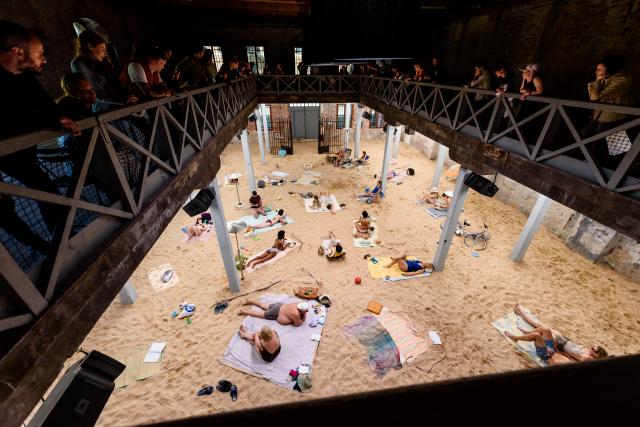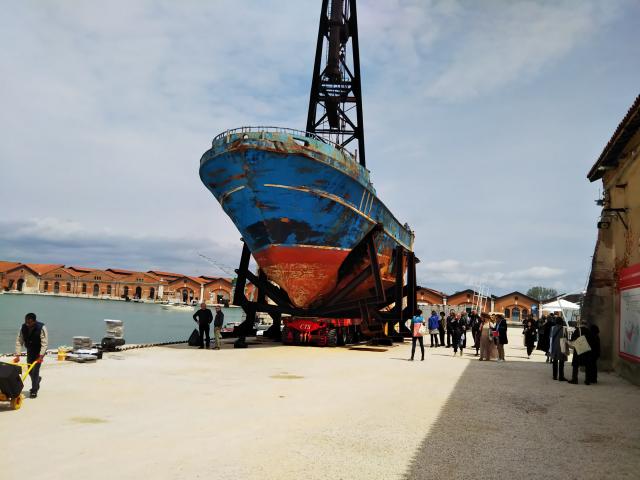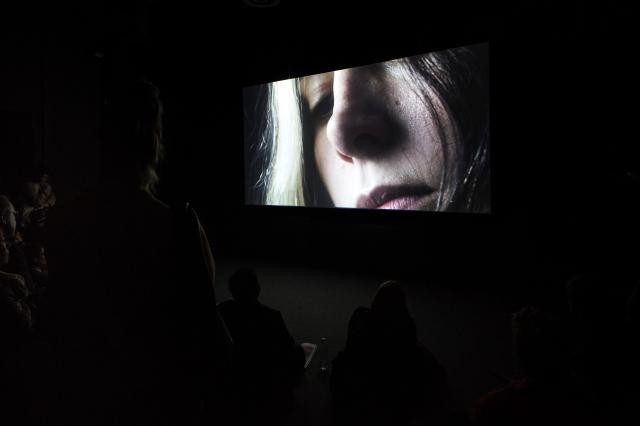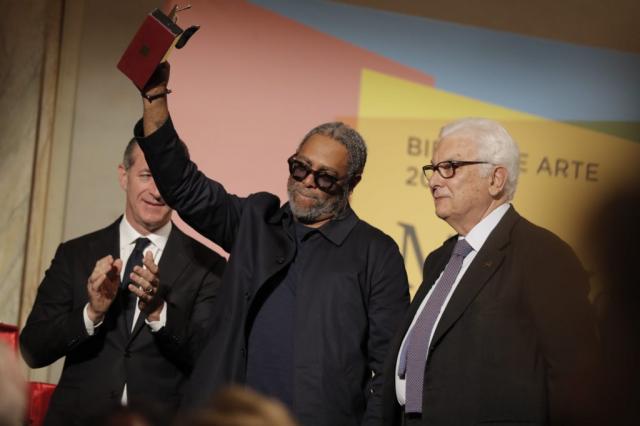第58回ベネチアビエンナーレ報告会 58th Venice biannual Report
第58回ベネチアビエンナーレ報告会
7月6日(土) 午後6時より 入場料500円(ドリンク付)
6th July sat. From pm 6 Fee Yen 500 with drink
会場:Art Lab TOKYO
講師:森下泰輔(現代美術家/美術評論家)
菅間圭子(アーティスト)
図録など参考資料の展示
第58回ベネチアビエンナーレで何が起こっているのかを解説する。
*森下泰輔 ベネチアビエンナーレ批評および記事
週刊新潮 1993
月刊ギャラリー 2005
美術運動 2015
しんぶん赤旗 2007~2019
*過去の報告会
第51回ベネチアビエンナーレ報告会 2005 銀座芸術研究所 チバ・アートスペース(小岩プロジェクトスペース) 北仲ホワイト(ポロニウム)
第52回ベネチアビエンナーレ報告会 2007 横浜ZAIM別館(横浜芸術振興財団助成) 銀座芸術研究所 DOORS
第53回ベネチアビエンナーレ報告会 2009 横浜ZAIM本館
第54回ベネチアビエンナーレ報告会 2011 新港村(新港ピア)・倭館(第4回ヨコハマトリエンナーレ関連企画)
第55回ベネチアビエンナーレ報告会 2013 さくらworks
第56 57回ベネチアビエンナーレ報告会 2015 2017 アートラボ・トーキョー
ディレクターであるラルフ・ルゴフが設定した主題「興味深い時代を生きられますように May you live in interesting times」は伝統的な中国の呪いの翻訳であるとされている英語の表現だ。一見すると祝福だが、この表現は通常皮肉なことに使われ、平和と静けさの「興味深くない時代」は歴史的観点から見ると無秩序と対立を含む興味深い時代よりも人生を豊かにする。
「世界の歴史は幸福の根拠ではありません。幸せの時代は彼女の空のページです」ゲオルク・ヴィルヘルム・フリードリヒ・ヘーゲル
哲学者Garson O'Tooleによる研究は、19世紀後半から20世紀初頭にかけてのオースティン・チェンバレンの父ジョセフ・チェンバレンの発言に起源があることを示している。アジアのイギリスの外交官から学んだという古代中国の呪いで呼びかけた。具体的には、O'Tooleはジョセフが南アフリカ奪取で行った第二次ボーア戦争前年1898年の演説の間に行った次の声明を引用する。また当時は英国覇権主義でアジアから太平洋の植民地支配を拡大している時代でもあった。
「私たちが最も興味深い時代に生きていることに皆さんは同意すると思います。私たちの歴史が一杯になったとき、その日のうちに私たちが新しい興味の対象をもたらしたこと、そして不安のための新しい対象ついても私に言わせてください」
息子のオースティン・チェンバレンは1936年3月、再び父の中国の呪いの言葉を引用した。イギリスの新聞、ヨークシャーポストの記事の中でおそらく最初に同文言は印刷された。彼は、その月のドイツ軍ラインランドへの侵攻によってもたらされたヨーロッパの集団安全保障に対する深刻な脅威を取り上げた。 「私たちはある危機から別の危機へと移行する」呪いが私たちに降りかかったことは疑いないとチェンバレンはスピーチで宣言した。以後80年以上に渡って多くの著名な作家や政治家(Arthur C. ClarkeからHillary Rodham Clintonまで)がこの言葉を引用した。
ところが、中国にはこれに該当する呪いの言葉などはじめから存在しなかった。ちなみにこの中国のことわざは英国では民俗学の範疇に加えられる。ルゴフは「西洋で作られたもう一つの「オリエンタリズム」」だという。
ルゴフは1に現在に重ねて「興味深い時代」すなわち戦争に向かう「不安な時代」ということでテーマを設定してアーティストに問いかけている。第二にはこのことを「フェイクニュース」ととらえ3行批判が飛び交うデジタルネット時代の情報の危うさに言及しているのだ。嘘の時代に芸術がどのように機能するかを少なくとも部分的には考慮している展覧会である。
「ソーシャルメディアの蔓延する影響から富の格差の拡大に至るまで、気候変動の加速から世界中の民族主義的な議題の復活まで、この展覧会の多くの作品で現代の懸念事項が取り上げられています。しかし、アートはその時代の文書以上のものであることを最初に認めておきましょう。ジャーナリズムや歴史的報道とは対照的に、芸術は事実の質感との違いを明確に示しています」ラルフ・ルゴフ
第三に、この種の芸術の流動的な複雑さを強調するために、ルゴフはビエンナーレの通常のフォーマットに少し調整を加えている。提案Aと提案Bに分けられている。ジャルディーニの中央パビリオンとアルセナーレ2会場に同一アーティストをリピートしたのだ。それらの作風はまったく異なっている。別々のアイデアや原則を中心にまとめられているからではなく、それぞれのアーティストの異なる側面を特徴とするからだ。
こうしたルゴフのキュレーションは、今年なくなったオクィー・エンヴェゾ―のマルクス再考のような政治的に左にシフトしたものとどうしても比較される。実は今回の「interesting」にしてもエンヴェゾー時の「not interesting」(ニューヨーク・タイムズ)を受けているのではないか、とすら思える。ルゴフは政治的主題を取り入れるも、多くの作品は新たな審美的・詩的な側面を強調したものだった。しかし、光州ビエンナーレ代表理事・金宣延を含む5人の審査員が選んだのは政治的作品だ。黒人差別問題を扱ったアーサー・ジャファ(米国)が企画展示部門最高賞の金獅子賞。国別部門ではリトアニアが受賞、水着を着た俳優を雇い倉庫に砂を撒きビーチを再現。海洋汚染など環境問題とリゾートのくだらなさをオペラで表現した。また特別賞がメキシコ危険地帯の公立学校の壁をそのまま展示したテレサ・マルゴレス。時代はエンヴェゾ―の主張を是としたのだった。
アフリカや周縁の小国の作家、女性作家も多く選ばれた。表現はヴォイド(空虚)性に向かう。また石や音(ノイズ)を用いた作品も多い。あるいはフォークロアに向かうパフォーマンスやインスタレーションなど、ベネチアで何が起こっているのかを解説する。
58th Venice biannual Report @ Art Lab Tokyo
6th July sat. From pm 6 Fee Yen 500 with drink
The theme "May you live in interesting times" set by the director Ralph Rugoff is an English expression that is said to be a translation of the traditional Chinese curse. Although seemingly blessed, this expression is usually used ironically, and the "not interesting period" of peace and tranquility, from a historical point of view, enriches life more than an interesting period that usually includes anarchy and confrontation.
“The history of the world is not the basis of happiness. The age of happiness is her empty page.”
Georg Wilhelm Friedrich Hegel
A study by the philosopher Garson O'Toole shows that it originates in the remarks of Austen Chamberlain's father Joseph Chamberlain from the late 19th century to the early 20th century. He called on the ancient Chinese curse that He learned from an Asian British diplomat. Specifically, O'Toole cites the following statement that Joseph made during the South African takeover during the Second Boer War speech of the year 1898: At that time, it was also a period of expanding British colonialism from Asia to the colonial rule of the Pacific.
"I think that you agree that we live in the most interesting times. When our history is full, we have brought new objects of interest on that day, and our anxiety let me tell you new targets for.”
His son Austen Chamberlain reiterated his father's Chinese curse in March 1936. The word was probably first printed in a British newspaper, an article in the Yorkshire Post. He highlighted the serious threat to European collective security brought about by the German invasion of Rhineland in same month. Chamberlain declared in a speech that there is no doubt that the curse has come upon us, "We will move from one crisis to another." For many more than 80 years, many prominent writers and politicians (from Arthur C. Clarke to Hillary Rodham Clinton) have quoted the term.
However, there was no such thing as the curse word that corresponds to this in China from the beginning. Incidentally, this Chinese proverb is added to the category of folklore in Britain. Rugoff said "It is the other orientalism that made in the West.”
Rugoff has asked the artists to set the theme on "the interesting times", that is, the "uneasy time to go to war" over the current one. Second, it refers to the danger of information in the digital network age, in which three lines of critique, regarding this as "fake news." It is an exhibition that at least partially considers how art works in a period of lie.
"From the pervasive effects of social media to the widening of wealth divide, many works of this exhibition address contemporary concerns, from accelerating climate change to the resurgence of nationalist agendas around the world. But first admit that art is more than the documents of that era, in contrast to journalism and historical coverage, art clearly shows the difference with the texture of facts "
Ralph Rugoff
Third, to emphasize the fluid complexity of this kind of art, Rugoff has made some tweaks to the biennale's usual format. It is divided into Proposal A and Proposal B. He repeated the same artist in the central pavilion of Giardini and the Arsenale 2 venue. There are quite different. Not because they are centered on different ideas and principles, but because they feature different aspects of each artist.
The Rugoff curation is compared with a politically left-shifted one like Okwui Enwezor 's Marx reconsideration, which has disappeared this year. Actually, it seems that even this "interesting" may have been received from Enwezor's "not interesting" in New York Times text. Although Rugoff incorporated political subjects, many of the works emphasized new aesthetic and poetic aspects. However, it is that five-juries, including Gwangju Biennale representative director Kim Sunjung, selected political works . Arthur Jafa (US), who dealt with the issue of discrimination against blacks, won the Golden Lion Award for the highest award in the exhibition section. In the national category, Lithuania won the award, hiring actors dressed in swimwear, installed sand a warehouse and reproducing a beach. We expressed the environmental problems such as marine pollution and the silliness of the resort with opera. In addition, Teresa Margolles whose special award displayed the walls of public schools in the Mexican danger zone. There were after Enwezo's idea.
Many artists from Africa and small countries around the world and women were also selected. The expression goes to reference about void. There are also many works using stones and sounds (noise). Or a performance or installation for Folklore are there. This recture explain what is happening in Venice today.








